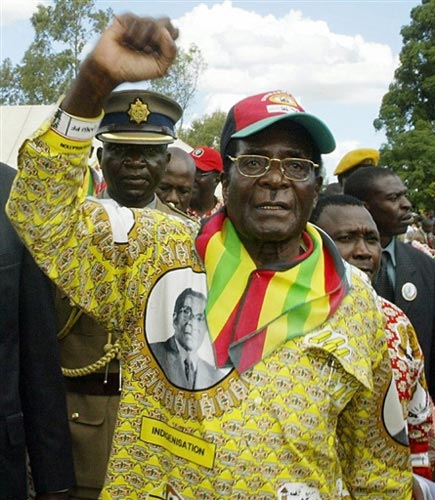
Now that he has won another five-year term to rule Zimbabwe, how are people going to bid farewell when 89-year-old Robert Mugabe finally retires?
Sunday View with Dalphine Tagwireyi
The jury is still out on him and opinions of people are divided, however the question remains: will he be viewed as an icon or mere bacon?
Like him or hate him, Mugabe has messages that resonate with a broad spectrum of Zimbabweans and Africans who are yet to fully enjoy the fruits of their independence in their countries.
To his supporters, the man is a hero of the colonial struggle and his regime has done well in areas including education, health and land redistribution, apart from purportedly economically empowering Zimbabweans.
According to filmmaker Roy Agyemang, “Mugabe is more than just a politician, he leads a cause, or as his militant supporters would say, he has become the cause itself. And the cause has something to do with giving back the African his dignity well beyond symbols of nominal independence.”
And Agyemang should know because he was given months of privileged access to Mugabe and his inner circle while shooting the documentary, Mugabe: Hero or Villain. Agyemang is not the only one gushing over Mugabe as even Dali Tambo, the son of South African struggle icon Oliver Tambo, described him as a “warm, charismatic man who has been misunderstood and ill-judged”.
But then again, this is the man whose opponents say he has not won an election ever since the emergence of the MDC in the 2000 elections. In 2002, in 2008 and as recent as last month he has been retained as president and all of this in highly controversial circumstances.
- Chamisa under fire over US$120K donation
- Mavhunga puts DeMbare into Chibuku quarterfinals
- Pension funds bet on Cabora Bassa oilfields
- Councils defy govt fire tender directive
Keep Reading
The controversy surrounding the man is not only about elections, it is also about the policies that have characterised his 33-year reign Barely two years after independence, Mugabe turned on his wartime allies Joshua Nkomo and his Zapu party, kicking most of them out of his cabinet and unleashed the notorious Korean trained 5 Brigade on Matabeleland provinces resulting in the death of thousands of civilians.
He has presided over massive corruption as his ministers and close associates have been fingered in one scandal after another.
With the exception of the Willowgate scandal where ministers abused their positions to cheaply acquire motor vehicles for resale, Mugabe has never taken action to stem the tide of corruption.
Though independence should be about reinforcing aspirations and hopes, it should also put in contact the goals and ambitions of a unified nation and focus endlessly on the bad days.
As the sole means of national justification is the construction of a nation moving away from something bad, not the actions of a nation moving towards something glorious.
Although leadership is about providing direction for the future, his democratic and human rights record has been criticised. Was he running from something or he is running towards something? His regime is continuously condemned for its abuses because it actually brought respect of human rights and democracy in the first place at Independence in 1980.
However, the reality is that there has been a widespread systematic human rights violations in Zimbabwe under Mugabe as they were during the colonial period.
This goes against his independence speech when he said, “An evil remains an evil whether practised by white against black or by black against white. Our majority rule could easily turn into inhuman rule if we oppressed, persecuted or harassed those who do not look or think like the majority of us.”
Hence the exit of the man, who has been at the country’s helm for 33 years now, voted for another five-year term yet again, seems to allude to the fact that he is admired as much as he is detested, hence the question still stands: Is Mugabe an icon?











